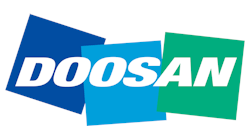One of the fundamental questions arising in the development of training programs is how substantial the program should be, and the even stickier wicket: how to build it to address long-term objectives you may not even be aware of yet.
Occasionally, serendipity brings together factors that result in development of a model that not only addresses these questions, but also proves useful beyond the immediate situation it was designed to address. A case in point is the Applied Associate Science Degree (AAS) in Heavy Diesel Technology co-developed by Washburn Institute of Technology in Topeka, KS, and Case Construction Equipment.
Take a heavy equipment dealership that is having difficulty hiring well-trained equipment service technicians who are ready to hit the ground running (in this case, The Victor L. Phillips Co. in Kansas City, KS), add a technical school looking to upgrade an existing training program, combine these with a manufacturer willing to supply resources, and you have an in-depth educational effort that took only six short months to develop and welcomed a full class of students the day it opened its doors in August 2013.
“Washburn Tech was going through a revitalization of its Midwest Training Center,” says James Ruffalo, Case Construction Equipment service development manager. “Case was looking to partner with a school to create a technician training program, and VLP was looking for well-trained and responsible technicians. All the pieces lined up and we were all onboard immediately.”
Fundamental to the initial discussions was that the program should offer students the opportunity to earn a two-year associate’s degree. “The industry has been pushing toward this type of a degree,” says Ruffalo, “because diesel technology is getting more and more complex. You can’t expect that just anyone who knows how to turn a wrench can work on the new machines. Developments like Tier 4 technology are causing the shade tree mechanic who undercuts the dealership to disappear.”
Another plus from Case’s standpoint was the opportunity well-trained technicians could provide dealerships looking to build tighter relationships with their customers. “I call it the circle of influence,” says Ruffalo. “You have to know a customer’s business so you can know how to support him. It begins when you sell him a piece of equipment and expands when you sell him parts, because now you’re getting an idea of what he’s doing with his machines. It expands even further when you service the equipment, because now you’ve got your hands on the machines and you’re involved in day-to-day operations, which makes it possible to assess how your customer is operating, which expands your ability to make better recommendations.”
Ruffalo thinks the era of machine self-diagnostics is coming to an end, and operators are returning to dealers for service. “The machines were down too long, and in-house technicians could spend a lot of time on the phone with dealers’ service departments. Given the number of computers on the machines and the number of perimeters you need to be able to identify, technicians need special tools, and they need to know how to program machines and download new software and upload it into the equipment. Someone who isn’t well trained runs the risk of hindering the functioning of a machine the more he plays with it.
“The level of technician training we’ve developed at Washburn Tech assures the customer that if his machine goes down, he has a highly trained professional working on it, somebody who went to school and has a degree. And from the dealership’s standpoint, if you have pride in what you do, you’re going to be a better employee.” Ruffalo says Case’s long-term plan is to feed technicians into three or four regional schools in the Midwest, the South and the western United States.
“Case’s vision was unusual,” says Washburn’s dean, Clark Coco. “Typically the work force says, “˜Give me students who are trained, and if they want to go on further, we’ll help them later on in life.’ But Case wants to see the student come out of the program with the associate’s degree. When you first start a program, you can find it hard to get enough people to fill it. In the first session of the Heavy Diesel Construction program, we filled up and actually overflowed. And given that response, we believe that in the future we’ll actually be able to identify and select students we want to recruit into the program.”
The two-year degree track consists of three parts: the diesel core curriculum, the courses in the student’s area of specialization, and general education courses. The core curriculum includes the following courses: Introduction to Diesel 1-2, Safety Skills, Workplace Skills, Powertrains 1, Engines 1-2, Welding, and Commercial Driver’s License. From there, students select a specialty from among Light and Heavy Wheeled Diesel, Large-scale Diesel Engineering, Large-scale Diesel Mechanical and the newly developed Heavy Diesel Construction program. Courses in Heavy Diesel Construction include: Advanced Machine Electrical, EST and Telematic Systems, Advanced Hydraulic Systems, Service Department Implementation, Heavy Equipment Powertrains for Construction, and an internship. Coco estimates the program breaks down to 30% lecture and 70% lab. Students will also be prepared to take the OSHA 10 certificate.
Students may end their studies with the 48 credit hours that accrue in the core diesel curriculum and their area of specialization and leave with a certificate. Those who elect to go for the associate’s degree take 19 credits of technical general education courses interspersed with the courses in their chosen specialization. These include Technical Writing, Technical Communications, Applied Physics, Technical Math 11, Computer Applications, and College Skills, for a total of 67 credits.
Achieving a Washburn Tech AAS degree is particularly significant because of the school’s unique relationship with Washburn University, which allows students to apply credit from the AAS program toward bachelor’s and master’s degrees at the university. “A person can come in and take the diesel core curriculum and then determine where he wants to go,” says Tim Clothier, coordinator of Washburn Tech’s Business and Industry Center. “Some people may want to extend into more than one specialization. The beauty of the program is the pathway aspect of it. Students have choices, which they didn’t have in the past.”
“The fact that students can apply their credits toward a bachelor’s of science degree means a dealership has options,” says Ruffalo. “Maybe they have a technician who went through Washburn Tech and is a great technician but has other skills, and the dealership wants him in management. With AAS credits, that individual could go back and get a bachelor’s degree and become that well-rounded manager the dealership is looking for.”
“The general education courses are not the most appealing courses, and sometimes they’re not the easiest for some students,” says Coco. “So when a student does complete them, he’s done something that he might not have been sure he could do. Given the time and effort it takes to do this, this indicates another level of maturity and responsibility. Spending time on writing a speech is not what some of our students were hoping to do. They want to get out and turn wrenches and solve problems. It’s s a maturing process of acceptance and responsibility.”
“In putting this program together, my primary motivation was to be able to continually attract qualified technicians who can work on our machines,” says Bill Esterly, VLP’s product support manager. “After the first year they’ll be interning with us. They’ll take a Case Construction technician assessment, which will basically tell us where they’re at after their first year and where the areas of opportunity are-weaknesses we need to focus on. They will take the assessment at the beginning and the end of the second year, so we’ll know which technicians are ready to come right in and start working.” Students who elect to sign a contract to work for the dealership for four years after school will receive financial support. In the past, VLP has provided tuition or a set of tools for its interns. During the Service Department Implementation, students will go the dealership and work with the parts manager, sales, service, and the rental department so they get a complete understanding how a dealership operates.
Case donated four skid-steer loaders to the program, three Tier 4 engines, two Tier 3 engines, a variety of machine components, and electronic service tools. It also helped develop the Heavy Diesel Construction curriculum and trained instructors at the Case New Holland Tomahawk facility in Racine, WI. Esterly makes the point, however, that the program is not proprietary and students will be prepared to work on other manufacturers’ equipment.
“A lot of students think they want to go into trucks,” says Esterly. “Maybe it’s because they think that’s where you go if you want to be a diesel technician. On opening day this year we had all the equipment there and five people from the dealership. We broke the students down into small groups and talked to them. After it was over, the person who was coordinating the event for Washburn estimated 70% of the students had expressed interest in the Heavy Diesel Construction program.”
“I think you’ll see more and more of these public private partnerships because the work force is starting to age,” says Clothier. “There’s such a demand for people who have hands-on, life-changing types of experiences. And that’s what you find here at Washburn Tech. I don’t think we could have asked for a better partner than the Case Construction group to work on a program like this.”


